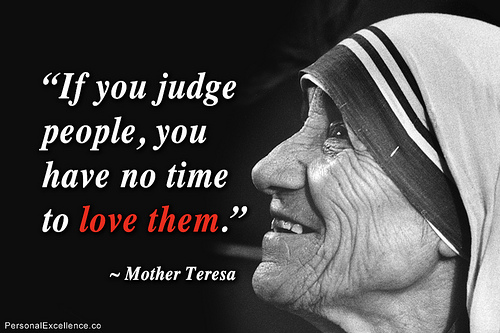We run our website the way we wished the whole internet worked: we provide high quality original content with no ads. We are funded solely by your direct support. Please consider supporting this project.
How Judging Blocks Love
What keeps us from fulfilling the law of love that is exemplified by Jesus and laid out in the Scriptures (Matt. 22:39-40; Rom 13:8,10 Gal 5:14)? In a word, we like to pass verdicts. To some extent, we get our sense of worth from attaching worth or detracting worth from others, based on what we see. We position ourselves as judges of others rather than simply as lovers of others. Our judgments are so instinctive to us that we usually do not notice them. Even worse, they are so natural to us that when we do notice them, we often assume we are righteous for passing judgment! Because of this, it is easy to overlook the fact that our judgments are blocking our love, keeping us asleep, preventing us from living in the truth God created us to live in.
Another way of saying this is that we fail to abide in love because we choose to live from our knowledge of good and evil. This is why the Bible depicts the origin of our separation from God as eating form the Tree of Knowledge of Good and Evil, which was in the middle of the garden (Gen 3:1-9).
Consider, why was the fruit of the forbidden tree a fruit that was said to give the knowledge of good as well as evil? Isn’t the “knowledge of good” a good thing? Aren’t we Christians supposed to be promoting “the knowledge of good”? Isn’t following God all about increasing our “knowledge of good and evil” so we can side with “the good” and resist “the evil”? And yet, whether it fits our preconceptions or not, in the Genesis narrative the nature of the sin that separates us from God is said to be the “knowledge of good and evil.”
What is it about eating fruit from the Tree of Knowledge of Good and Evil that warrants its depiction in Scripture as the source of original sin? How does living from our knowledge of good and evil separate us from God? These questions are rarely asked and even more rarely investigated with any thoroughness. It is largely for this reason that the church has failed so miserably at loving the way Christ commands us to love.
We have failed to understand and internalize the biblical teaching that our fundamental sin is not our evil—as though the solution for sin was to become good—but our getting life from what we believe is our knowledge of good and evil. Our fundamental sin is that we place ourselves in the position of God and divide the world between what we judge to be good and what we judge to be evil. And this judgment is the primary thing that keeps us from doing the central thing God created us to do, namely, love like he loves.
Because we do not usually understand and internalize the nature of our foundational sin, we usually think our job as Christians is to embrace a moral system, live by it, and thus to be good people in contrast to all those who are evil. In fact, God’s goal for us is much more profound and much more beautiful than merely being good: it is to do the will of God by being loving, just as God is loving. God’s goal for us is to discover a relationship with him and thereby a relationship with ourselves and others that returns us to a state where we don’t live by our knowledge of good and evil.
Walking in obedience to God, we are still to detect good and evil, of course. Living in love in no way implies moral relativism. But we are not to derive any worth from our detection of good and evil. Nor are we to draw conclusions about people on the basis of it. We are to derive worth from God alone and to love without judgment and without conditions on the basis of the unsurpassable fullness we get from God. Out job is to love, not judge.
—Adapted from Repenting of Religion, pages 16-18
Category: General
Tags: Judgment, Kingdom Living, Love, Tree of the Knowledge of Good and Evil
Topics: Following Jesus
Related Reading

The Gift of Smallness
ram reddy via Compfight Jonathan Martin wrote this piece entitled Feeling at home in my smallness a couple of weeks ago. If you’ve been feeling like the weight of the world is on your shoulders and it’s up to you to do something amazing or if you’ve been taking yourself a little too seriously, you…

Lies, Truth, and the Holy Spirit
The root of the flesh is a lie about who God is and who we are. Satan brings us into bondage of the flesh by convincing us that God is not the loving God he says that he is. In doing this, Satan convinces us that we cannot find fullness of life by being wholly…

Following Jesus Doesn’t Work
I met a middle aged woman one day who told me she had given up on Christianity. “It just didn’t work for me,” she said. My response was: “What on earth made you think Jesus was supposed to work for you? The truth is that you were supposed to work for him.” The sentiment is…

Revolting Against Judgment
A few years ago, I committed to blessing all people at all times. (See yesterday’s post for more about this.) The first thing I noticed was how many “non-blessing” thoughts I had about people. I wasn’t very aware of it before, but my brain often created a running commentary on the people I observed or…

Vacationing in a War Zone
Suppose a family decided to go on vacation to a nice cabin on a beautiful shore in a distant country. This vacationing family naturally wanted to tune out the problems of the world, indulge themselves, relax and enjoy life and each other as much as possible. This is simply what families do on vacation. Now…

Is Having the “Right” Theology the Core of Christianity?
Last week, we posted a piece by Greg that challenges the practice being violent “in the name of Jesus” toward others who err theologically. (Click here to read this post.) Being that this piece got a lot of attention, we thought it worthwhile to provide some further explication to this point, especially in the light…

